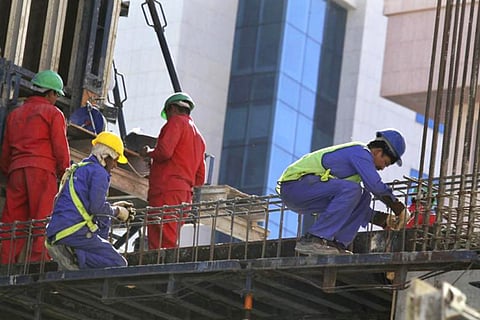Saudi Arabia needs its expat workforce
Let us appreciate the millions of workers, a rarely-acknowledged army of people, who oil the machines that help ensure smooth running of our lives

The working expatriate in Saudi Arabia has occasionally been criticised for many of the country’s social and economic ills. Sometimes back, a Saudi writer wrote an opinion piece titled ‘Expat workers pose a danger to our country’. To bolster his argument, he had mentioned the incident where workers of a construction company, who had remained unpaid for months, took out their frustration by setting fire to a few company buses. The workers had been languishing with promises of being paid for months before being told that they would be sent back to their respective countries without paying their dues as the company was in financial distress.
The writer had warned that “We have to realise that the large number of expatriate workers in this country could really be dangerous ... some of them can pose security threats to this country. In my opinion, such workers are time bombs that could go off any minute.”
Now, whenever there is an incident of wrongdoing, involving the expatriate workforce, is reported in the press, it is usually followed by calls raising the threat perception from these people in Saudi society. After reading enough of these generalised warnings against the unskilled and semi-skilled expatriate workforce in Saudi Arabia, I have to ask this question: Can we really get by without their presence?
Let us take a look at some of the activities these workers are engaged in. To begin with, Saudi municipal workers comprise large numbers of expatriate workers industriously engaged in keeping the cities clean and carting the trash away. As Saudi Arabia’s cities strain from a growing population, so do the amount of litter and garbage that have to be removed. And this is being judiciously done by the expatriate workers.
Saudi Arabia’s booming construction industry has necessitated the recruitment of large numbers of semi-skilled expatriate workers. Some load cement on to mixers, others shovel and dig, still others prepare the ground for laying the foundations. Many are perched precariously high on the scaffolds around skyscrapers, daily placing their lives at risk. For them, there is little or no safety-net of a comprehensive medical insurance, with the temperatures often hovering above 40 degrees Celsius and with very high humidity levels. Saudi streets are under a constant state of rework for laying out sewage networks. Guess who is primarily involved in the actual digging and setting of the massive pipes for these projects? It certainly isn’t any Saudi national that I know of.
Trees get pruned and grass in public parks mowed and watered diligently by the migrant workers. The waste from our septic tanks is flushed out and carted off by tankers by operators from foreign countries. And owing to the highly inefficient water distribution network, potable water to our homes is delivered by tankers driven by Asians.
When we have to get around and use taxis or hire limousines, we are usually chauffeured around by expatriate drivers. And when our personal vehicles need to be serviced or repaired, the task is generally accomplished by expatriate technicians.
Around the house, if there is a need for plumbing or electrical work to be done, guess who is available to do the job and without much fuss? Want to install curtains or re-upholster your furniture? There are plenty of talented expatriates who will do the work quickly and efficiently.
Saudi factories and other industries employ a large number of migrant workers, often resigned to pitiful living and working conditions and making do with very low wages. Yet, the job gets done without any complaint. In some cases, their circumstances are an affront to human rights.
Most of these tasks are being undertaken by expatriate workers because Saudis show little inclination to do them. These workers are not taking jobs away from Saudis, but, instead, are performing a service essential to all of us and in most cases they are doing them well.
Does the Saudi writer know where would we be without them? Let us not delude ourselves into believing that Saudis today would readily fill in these posts and professions. One would not stumble upon a substantial number of Saudis queuing up for such professions held by these expatriate workers.
Starting this month, Saudi Arabia has begun taxing dependents of each expat to the tune of 100 Saudi riyals (Dh98) per month. Are the financial gains from such taxation measured against real-time gains?
Only time will tell. But meanwhile, let us appreciate the millions of expats in Saudi Arabia, a silent and rarely acknowledged army of people that oils the machines that run the rest of us. Wonder where would we Saudis be without them?
Tariq A. Al Maeena is a Saudi socio-political commentator. He lives in Jeddah. You can follow him on Twitter at www.twitter.com/@talmaeena.



